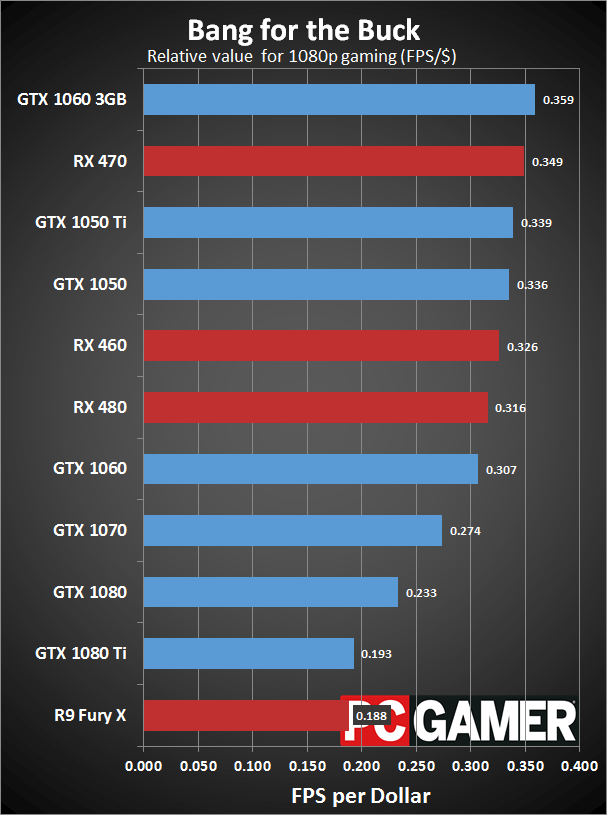perbandingan performa vs harga berapa jenis VGA


artikel lengkap :
sumber :


artikel lengkap :
Nvidia’s newly crowned Pascal patriarch, the GTX 1080 Ti, has arrived and disrupted the GPU performance hierarchy, rearranging the graphics card status quo with better-than-expected benchmarks but also a gold-plated $699 list price.
While the new Titan-topping consumer card is the natural choice for no-compromise system shoppers, it’s the resulting downward pressure on product pricing across the line that will affect gamers the most. In the real world of rig building on a budget, halo product pricing is all about indirect effects. After all, most people aren’t willing to drop the dollars Nvidia is asking for the 1080 Ti, however sweet the silicon may be.
Jarred’s 1080 Ti review confirms this with a performance-to-price ratio that places Nvidia’s premium product close to the bottom on the Bang for the Buck index. That’s no surprise; bleeding-edge bragging rights aren’t cheap. That value won’t improve much as the card ages either; like Maxwell, where the 980 Ti’s introduction left little reason to consider the 980, Pascal’s now-deposed 1080 resides in the no man’s land many best-in-class products fall into after replacement. Evolution in tech is brutal.
Priced too high for mid-range buyers but not fast enough for connoisseurs, former flagships are a hard sell and tend to share bunk space with one another in the bang-for-buck dungeon. AMD’s aging Fury, the 980, and the 1080 are all doing time there nowadays, although Nvidia’s smart price cuts of $100-150 on the 1080 series improve the situation somewhat, creating even price breaks of roughly a Benjamin in between each of the cards from the mid-range on up. Performance is less evenly distributed however, and on that lumpy curve the best deal in Pascal continues to be the GTX 1070, which mixes big iron capability with prices much closer to earth, including a $50 price cut of its own on the FE edition.
Other than Nvidia’s official cost adjustments, which are still rippling through the market, a check of GPU trends shows prices holding steady. This situation will likely change as Nvidia’s price drops become widespread, older but competitive products such as the 980 Ti disappear from shelves, and AMD’s upcoming Vega-based GPUs arrive. Another curve down the road are several design variations now available for Nvidia third parties to explore that improve GDDR5X speed for 1060 and 1080 models, complicating future price vs performance calculations further.
Nvidia’s other big introduction is the 1050 series, doing battle in AMD’s bread-and-butter mid-range market and proving a credible foe, beating both the RX 460 and the RX 480 slightly in value per dollar but losing to the RX 470. Nvidia’s mid-range hero, the 1060, brackets this category with superior performance at a sizeable cost markup on one end and a clever but compromised budget option on the other.
Fully featured 6GB versions of the 1060 underperform on a value-per-dollar basis against the AMD cards and Nvidia’s own new 1050 twins, but the tables are reversed for 3GB versions of the 1060, which take top overall honors when it comes to bang for the buck. These chart-topping results come with some caveats, however; 3GB just isn’t enough for many gaming situations today, and certainly won’t be later, so plan carefully. The 3GB version of the 1060 isn’t for everyone.
Which brings up a last point for all the mid-range cards so far this generation. Don’t let their chart-topping value scores fool you. While these products perform well in terms of relative cost and provide reasonable experiences at 1080 resolution and 60Hz, the gaming industry is rapidly moving towards higher resolutions, faster refresh rates, and features like hardware HDR, all of which will require more firepower for fluid, low-latency framerates than any of these cards provide. Serious gamers and hardware hobbyists will need to venture toward the pricey side of the chart to find the speed and features they are looking for. After all, 200 bucks for a GPU isn’t much of a bargain if all it buys is disappointment.
sumber :
Code:
http://www.pcgamer.com/graphics-card-comparison
